
The Turks and Caicos Islands are a British Overseas Territory consisting of the larger Caicos Islands and smaller Turks Islands, two groups of tropical islands in the Lucayan Archipelago of the Atlantic Ocean and northern West Indies. They are known primarily for tourism and as an offshore financial centre. The resident population in 2023 was estimated by The World Factbook at 59,367, making it the third-largest of the British overseas territories by population. However, according to a Department of Statistics estimate in 2022, the population was 47,720.

Bermuda is the oldest British Overseas Territory, and the oldest self-governing British Overseas Territory, and has a great degree of internal autonomy through authority and roles of governance delegated to it by the national Government. Its parliament held its first session in 1620, making it the third-oldest continuous parliament in the world. As part of the British realm, King Charles III is head of state and is represented in Bermuda by a Governor, whom he appoints on the advice of the British Government. The Governor has special responsibilities in four areas: external affairs, defence, internal security, and policing.

His Majesty's Government of the Virgin Islands is the democratically elected government of the British Overseas Territory of the British Virgin Islands. It is regulated by the Constitution of the British Virgin Islands.

The British Overseas Territories (BOTs) or alternately referred to as the United Kingdom Overseas Territories (UKOTs) are the fourteen territories with a constitutional and historical link with the United Kingdom that, while not forming part of the United Kingdom itself, are part of its sovereign territory. The permanently inhabited territories are delegated varying degrees of internal self-governance, with the United Kingdom retaining responsibility for defence, foreign relations, and internal security, and ultimate responsibility for governance. Three of the territories are chiefly or only inhabited by military or scientific personnel, the rest hosting significant civilian populations. All fourteen have the British monarch as head of state. These UK government responsibilities are assigned to various departments of the Foreign, Commonwealth and Development Office and are subject to change.
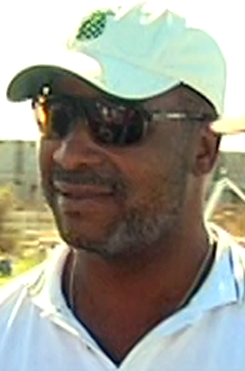
Michael Eugene Misick is a Turks and Caicos Islander politician who was the 7th Chief Minister of the Turks and Caicos Islands from 15 August 2003 to 9 August 2006 and was the 1st Premier of the Turks and Caicos Islands from 9 August 2006 to 23 March 2009. Misick is a member of the Progressive National Party (PNP) and became chief minister when his party, after eight years as the opposition party, gained two parliamentary seats in by-elections. In addition to being premier, he was also the minister for Civil Aviation, Commerce and Development, Planning, District Administration, Broadcasting Commission, Tourist Board, Turks and Caicos Investment Agency, and Tourism. Several other members of Misick's family have been politicians in the Turks and Caicos Islands, and important leaders in the PNP. Washington Misick, his brother, is the current Premier, former Chief Minister and former Minister of Finance.

Before European colonization, the Turks and Caicos Islands were inhabited by Taíno and Lucayan peoples. The first recorded European sighting of the islands now known as the Turks and Caicos occurred in 1512. In the subsequent centuries, the islands were claimed by several European powers, with the British Empire eventually gaining control. For many years the islands were governed indirectly through Bermuda, the Bahamas, and Jamaica. When the Bahamas gained independence in 1973, the islands received their own governor, and have remained a separate autonomous British Overseas Territory since. In August 2009, the United Kingdom suspended the Turks and Caicos Islands' self-government following allegations of ministerial corruption. Home rule was restored in the islands after the November 2012 elections.
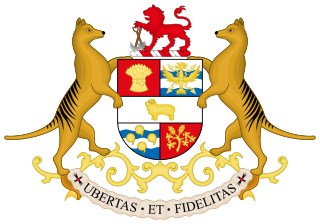
The Parliament of Tasmania is the bicameral legislature of the Australian state of Tasmania. It follows a Westminster-derived parliamentary system and consists of the governor of Tasmania, the Legislative Council, and the House of Assembly. Since 1841, the Legislative Council has met in Parliament House, Hobart, with the House of Assembly following suit from its establishment in 1856. The Parliament of Tasmania first met in 1856.

A Crown colony or royal colony was a colony governed by England, and then Great Britain or the United Kingdom within the English and later British Empire. There was usually a governor to represent the Crown, appointed by the British monarch on the advice of the UK Government, with or without the assistance of a local council. In some cases, this council was split into two: an executive council and a legislative council, and the executive council was similar to the Privy Council that advises the monarch. Members of executive councils were appointed by the governors, and British citizens resident in Crown colonies either had no representation in local government, or limited representation in a lower house. In several Crown colonies, this limited representation grew over time. As the House of Commons of the British Parliament has never included seats for any of the colonies, there was no direct representation in the sovereign government for British subjects or citizens residing in Crown colonies.
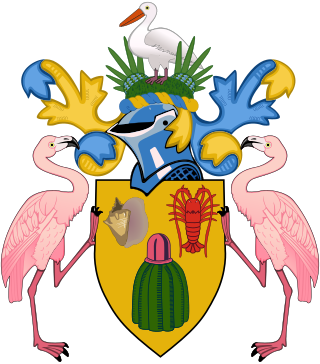
Politics of the Turks and Caicos Islands takes place in a framework of a parliamentary representative democratic dependency, whereby as of August 9, 2006 the Premier is the head of government, and of a multi-party system. The islands are an internally self-governing overseas territory of the United Kingdom. The United Nations Committee on Decolonization includes the Turks and Caicos Islands on the United Nations list of non-self-governing territories. Executive power is exercised by the government. Legislative power is vested in both the government and the Legislative Council.
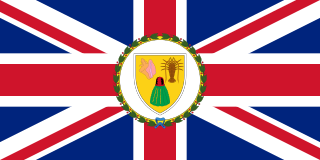
The governor of the Turks and Caicos Islands is the representative of the British monarch in the United Kingdom's British Overseas Territory of Turks and Caicos Islands. The Governor is appointed by the monarch on the advice of the British government. The role of the governor is to act as the vice-regal representative of the head of state, His Majesty King Charles III. The Governor appoints the Premier and 5 members of the House of Assembly. The official residence of the governor is the Government House of Turks and Caicos Islands, located in Waterloo on the island of Grand Turk.

The Premier of the Turks and Caicos Islands is the political leader and head of government. The post of premier is the equivalent to chief minister or prime minister in other British Overseas Territories. It is the highest political level that can be attained within the British colonial system. Prior to 2006, the position was known as the Chief Minister of the Turks and Caicos Islands.
Carlos W. Simons QC is a Turks and Caicos Islands lawyer and politician.
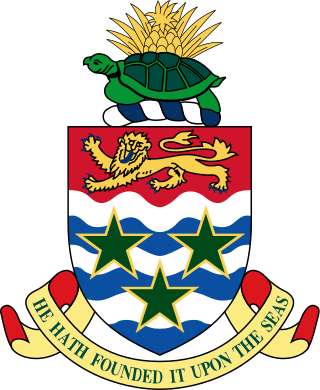
The Parliament of the Cayman Islands is the unicameral legislature of the British Overseas Territory of the Cayman Islands. It is composed of 21 members; 19 elected members for a four-year term and two members ex officio.
The royal prerogative is a body of customary authority, privilege, and immunity recognized in common law as belonging to the sovereign, and which have become widely vested in the government. It is the means by which some of the executive powers of government, possessed by and vested in a monarch with regard to the process of governance of the state, are carried out.

Gibraltar is a British Overseas Territory located on the southern end of the Iberian Peninsula at the entrance of the Mediterranean Sea. During the early days of the British administration, Gibraltar was maintained primarily as a military outpost with limited attention paid to its role as a trading post. Initially long term settlement of Gibraltar was uncertain but as Spain's power waned it became established as an important base for the British Royal Navy. Throughout the 19th century there was conflict between the competing roles of military and trading posts, leading to tensions between the civilian population and the Governor of the day. Some Governors encouraged the development of the civilian role in government, whilst others regarded it as a nuisance. As a result, compared with other former British colonies, civilian Government in Gibraltar emerged largely in the 20th century as the needs of the civilian population were often considered by Governors as subordinate to the needs of the military. Since World War II, Gibraltarians have increasingly asserted their own individual identity. The Rock's relationship with Spain and the sovereignty dispute continues to affect the Politics of Gibraltar to this day.
The Attorney-General of the Turks and Caicos Islands is the legal adviser to the Government and House of Assembly of the Turks and Caicos Islands. Previously administered indirectly via Bermuda, Jamaica and the Bahamas, the islands received their own governor and became a separate autonomous British Overseas Territory when Bahamas became independent in 1973.
The Cabinet of the Turks and Caicos Islands comprises the ministers who advise the governor on government affairs. It was known as the Executive Council under the 1988 Constitution, and was given its current name in the 2006 Constitution. The Cabinet was disbanded in 2009 when self-government in the Turks and Caicos Islands was suspended. It was reconstituted after the 2012 election.

Sharlene Linette Cartwright-Robinson JP is a Turks and Caicos Islander politician and lawyer who served as the 4th Premier of the Turks and Caicos Islands from 20 December 2016 to 20 February 2021. She was the territory's first female premier. She was also the first woman to become first, deputy head, and then, head of the People's Democratic Movement (PDM).

The potential political association of the Turks and Caicos Islands along with Canada is a recurring topic perennially discussed at times in various cross sections of society of both nations, and usually emerging in discourse during northern hemispheric winter. The islands are currently a British Overseas Territory under the sovereignty of the United Kingdom which covers the territory's foreign affairs and national defence.

General elections will be held in the Turks and Caicos Islands on 7 February 2025 to determine the composition of the Parliament of the Turks and Caicos Islands. Significant constitutional changes will be in effect and will be the first general election in which nine at-large MPs will be elected.


















